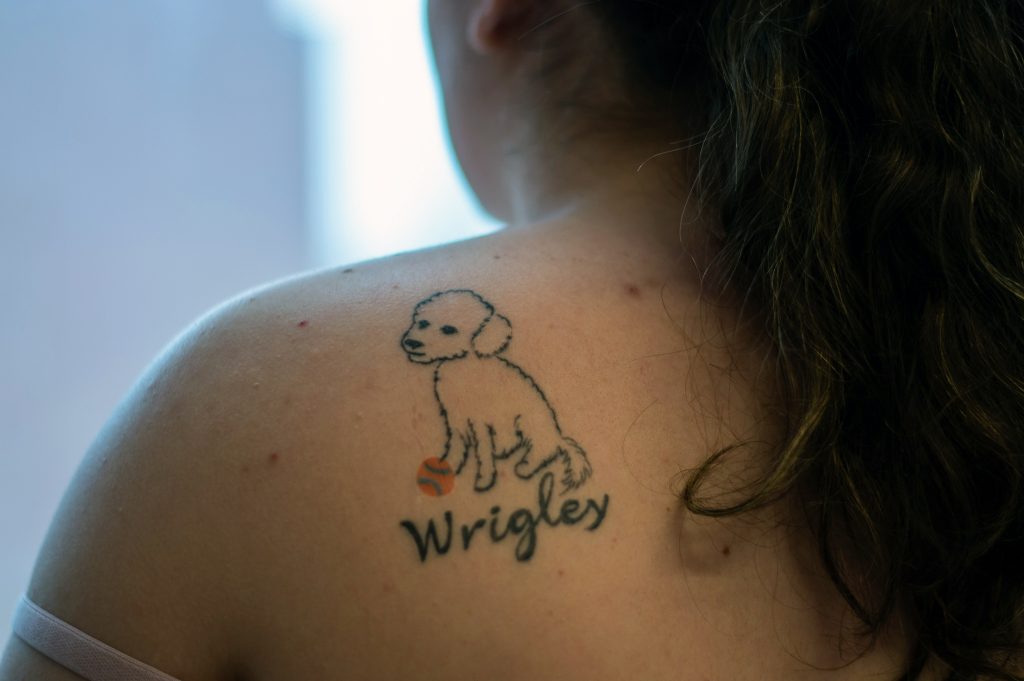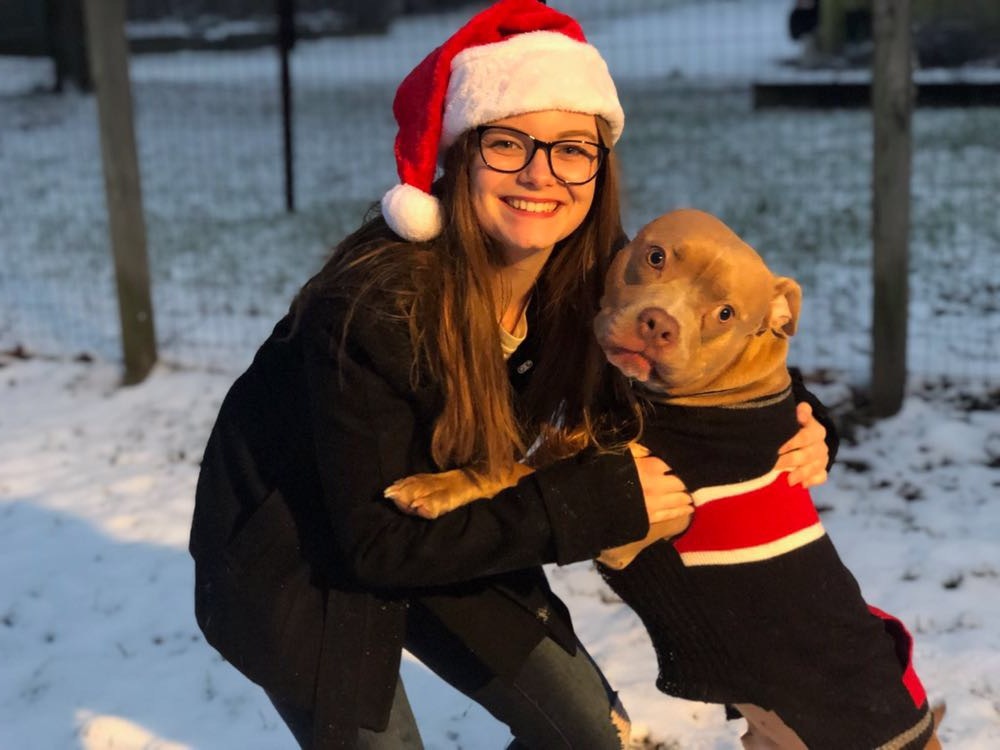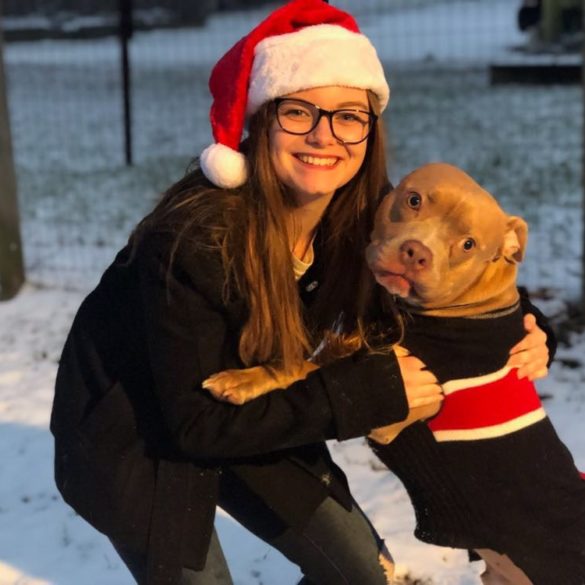Humans and animals have been helping one another for centuries, forming strong friendships and loving each other unconditionally.
Lori Morrow first saw Bourbon’s amber-colored eyes late one night in July 2018. Scrolling through Twitter, she found a post from Muncie Animal Care. After seeing the smile that took up the stray pit bull’s whole face, the Ball State University psychology major couldn’t fall back to sleep.
“I knew right away I had to bring him home,” Lori says. “I never believed in love at first sight or predetermined relationships, but Bourbon really felt like he was meant to be my dog.”
Bourbon was first taken in by the animal shelter after he was found on the streets of Muncie in March 2018. He displayed aggressive tendencies, such as guarding his food, which the shelter workers believed was a result of abuse. While the shelter worked with Bourbon and trained him to be more calm, Lori says it was still hard for people to see past his breed. Bourbon spent about five months at the shelter, and Lori saved him from being euthanized.
Lori didn’t care about Bourbon’s breed—in fact, she loved that he was a pit bull. Lori grew up with pit bulls, and despite their rough reputations, she sees them as “babies who want to please their owners.”
When Lori brought Bourbon home, he acted like he’d lived there his whole life. He immediately ran into the house, into Lori’s room, and onto her bed. Lori then took Bourbon out to their fenced-in backyard, where they played fetch. This was when Lori found out that Bourbon isn’t the best to play fetch with because he doesn’t like to bring the ball back, so he plays with the toys by himself. Whenever Lori lets Bourbon into the backyard with his toys, it can be difficult to get him back in the house.
“I could tell he’d never had a yard or place to run where he felt safe before,” Lori says.
While Bourbon displayed some separation anxiety when she first brought him home—sometimes chewing things up when Lori left—he seems to be getting better now.
“He makes messes every now and then, but I don’t mind too much,” Lori says.
Lori has dealt with depression for most of her life, and one day a few months after Bourbon came home was especially bad. As she laid in bed, Bourbon rested his head on her shoulder and looked at her with those big amber eyes. Then he sighed in a way that made Lori feel validated and understood. In that moment, she knew it was okay to take a day to relax. It was okay to feel upset. It was all okay because Bourbon was there.
Alan Beck, director of the Center for the Human-Animal Bond at Purdue University, says humans and animals have been helping one another since animals were first domesticated. The idea of loving animals has been around just as long but only formally studied in recent decades. The term “human-animal bond” was introduced in the late 1970s by the Delta Society at Washington State, and people realized something deeper was going on than just love for animals. Instead, the human-animal bond is similar to the mother-child bond, where the pet is like the child, and the owner is like the caregiving mother.
According to the American Veterinary Medical Association, human-animal bonds are mutually-beneficial relationships in which animals and humans interact to create healthy lives for one another. This includes psychological, physical, and emotional interactions.
Lori makes sure her interactions with Bourbon are always positive, to help him heal from his likely-abused past. She tries to teach him to be less protective of his things.
Lori often feeds Bourbon by hand, holding his bowl and staying near him as he eats. She does the same with toys.
“There have been a couple times with dog bones where he’s growled a little too much for comfort, and I took the bones away,” Lori says.
Lori doesn’t spank Bourbon, or even yell at him. She doesn’t want him to be scared of living with her.
According to an article by Colin Groves of the Australian National University, dogs have helped humans survive, serving as aides for alerting, tracking, and hunting. Dogs have also been children’s guardians and playmates. In return, humans provide dogs with food, shelter, and comfort.
Beck says animals can sometimes fit right into our lives in ways human companions might not. For example, pets aren’t seen by other loved ones as “competitors.” People don’t feel jealous of pets in the same way they might with other humans. Social support is essential for humans to thrive, and animals can often provide that comfort in a more unconditional way.
Payton Lusk, a Ball State sophomore advertising major, can attest to that.
“Wrigley is my best friend in the whole world,” Payton says of her Pekingese-poodle mix. “He is like a kid to me. I feel that deeply about him. We kind of need each other every day.”
If that doesn’t explain their deep bond, maybe the tattoo of Wrigley on Payton’s left shoulder will.

Payton has had Wrigley since she was six years old. Before coming to college, they were inseparable. Now Payton doesn’t go back home to Urbana, Illinois, to see Wrigley as often as she would like, but when she does, they pick up where their friendship left off.
They spend as much time as they can together when Payton is home, mostly because Wrigley always follows her around. Wrigley and Payton cook together––well, more of Payton cooking and Wrigley waiting for her to drop food on the floor. Now at 13, Wrigley has arthritis, so Payton takes him on walks in a dog stroller around Meadowbrook Park in Urbana.
“He is just always someone I can talk to if I need to vent about something,” Payton says. “Whenever he isn’t feeling good, I take care of him and give him lots of love and attention until he feels better.”
Despite the 200-year-old saying that dogs are “man’s best friend,” other animals can share this bond with humans, too. Dogs, cats, fish, horses, hamsters, snakes, and so many others have been domesticated into members of the family.
Lori found her soulmate at her local animal shelter, just one of an estimated 14,000 shelters and pet rescue groups in the U.S. For more information about the 260 dogs and cats available for adoption at Muncie Animal Care, call 765-747-4851.




